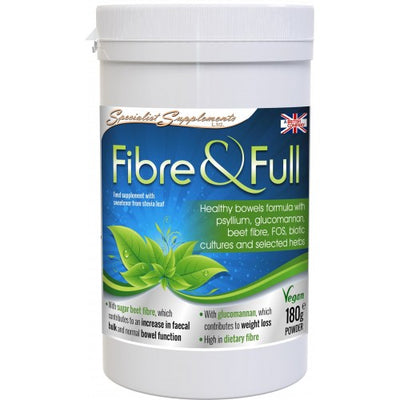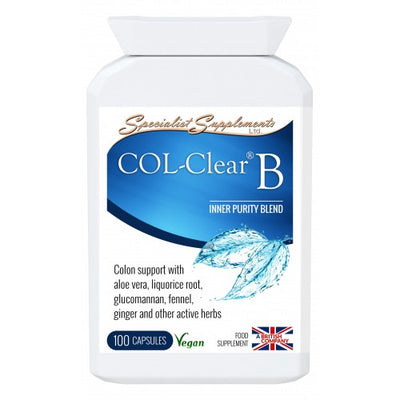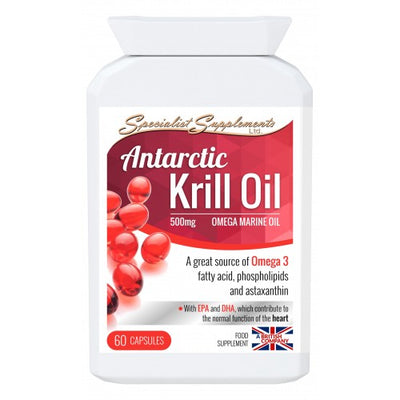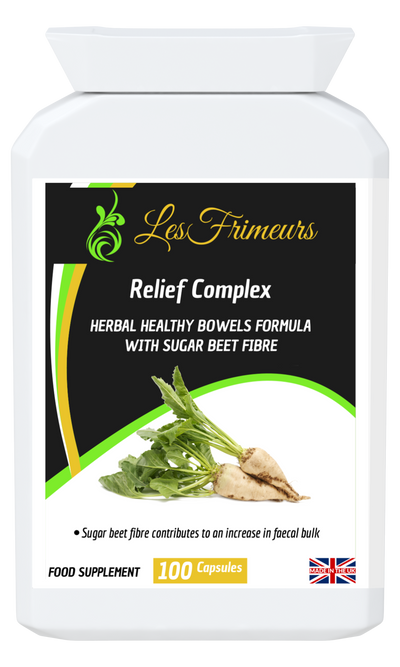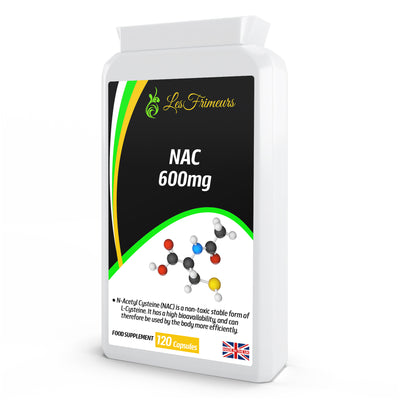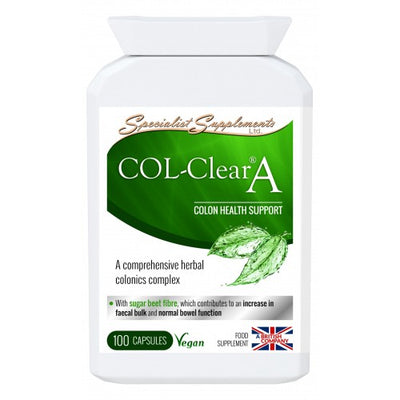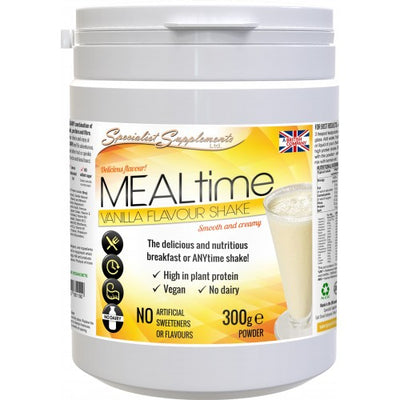Fibre & Full
Product summary:
180g powder
Fibre & Full is a vegan-suitable, high in dietary fibre, bulk and weight loss support combination supplement, with psyllium husks, sugar beet fibre, bacteria, prebiotics (FOS), glucomannan fibre, L-Glutamine and herbs (fennel seed, peppermint leaf and ginger root).
It is ideal used as part of a cleanse and detox programme, digestive health programme and/or weight management programme. It can be alternated or combined with COL-Clear A, COL-Clear B or Oxy-Klenz.


More information:
Fibre & Full at a glance...
Healthy bowels blend
High in fibre (from psyllium husk, glucomannan and sugar beet)
Contributes to an increase in faecal bulk
Support of weight loss
Support of normal blood cholesterol levels
With bacteria (Lactobacillus acidophilus and Bifidobacterium bifidum)
With FOS fibres and herbs
Contains the amino acid L-Glutamine
In a tasty, easy-to-take powder form
Suitable for vegetarians and vegans
Fibre as part of a balanced diet
The process of elimination can take anywhere from 12 to 24 hours, or even longer. Broadly speaking, the shorter the time, the better.
Unfortunately, modern eating habits and lifestyles have a tendency to increase digestive transit times quite considerably - for example, because foods high in saturated fats, sugar and artificial additives are harder for the body to digest and tend also to be low in natural dietary fibre.
As transit time increases, the stool becomes increasingly hardened and difficult to pass. Moreover, as the body re-absorbs the fluid content of the waste-matter that has failed to move through the digestive tract and be eliminated, it also re-absorbs soluble toxins.
Fibre is a key ingredient to a healthy, varied and balanced diet.
About sugar beet fibre
Sugar beet, cultivated Beta vulgaris, is a plant whose root contains a high concentration of sucrose (as its name suggests). It is grown commercially for sugar production. Sugar beets are related to other B. vulgaris cultivars, such as beetroot and chard.
Sugar beets consist of approximately 75% water, 20% sugar and 5% cell walls. After the sugar is extracted, remaining cell wall material - the sugar beet pulp - is used to produce the sugar beet fibre.
This source of dietary fibre contains both soluble and insoluble fibres. The main fibre types in sugar beet fibre are insoluble hemicellulose (22-32 %) and soluble pectin (22-29 %), but also smaller amounts of cellulose and lignin. It has a water-holding capacity of 3-4 times its own weight.
Compared to many conventional natural sources of dietary fibre, such as cereal products and fruits, sugar beet fibre has the following advantages:
- It has a higher content of dietary fibre, with an ideal balance of 2/3 insoluble fibre.
- It contains no phytic acid (cereal products, such as bran and flour, contain phytic acid which forms strong chemical complexes with iron and zinc and can consequently impair or reduce the natural absorption of these essential minerals in the human body).
- It is naturally free from gluten, which means it is an excellent dietary fibre source for people suffering from gluten intolerance.
Sugar beet fibre contributes to an increase in faecal bulk in two ways: the insoluble components of the fibre increase faecal bulk by absorbing water in the large intestine, while the soluble components are fermented by bacteria in the large intestine leading to an increase in bacterial mass. Click here for EFSA scientific opinion.
About psyllium husks
Psyllium is a form of dietary fibre sourced from the Plantago ovata plant, specifically from the husks of the plant’s seed. It sometimes goes by the name Ispaghula. Psyllium is produced commercially mainly for its mucilage content. The term "mucilage" describes a group of clear, colourless gelling agents derived from plants. The mucilage obtained from psyllium comes from the seed coat. Mucilage is obtained by mechanical milling (i.e. grinding) of the outer layer of the seed. Mucilage yield amounts to about 25% (by weight) of the total seed yield. Plantago-seed mucilage is often referred to as husk, or psyllium husk. The milled seed mucilage is a white fibrous material that is hydrophilic, meaning that its molecular structure causes it to attract and bind to water. Upon absorbing water, the mucilaginous gel that forms increases in volume by ten times or more.
Weight management support
This formula includes glucomannan (a form of soluble fibre derived from the konjac root) and stevia leaf extract.
Glucomannan contributes to weight loss in the context of an energy-restricted diet. This beneficial effect is obtained with a daily intake of 3g of glucomannan in three doses of 1g each, together with 1-2 glasses of water, before meals. 1 teaspoon of Fibre & Full powder (5g) contains 1g of glucomannan. Click here for EFSA scientific opinion.
Glucomannan also contributes to the maintenance of normal blood cholesterol levels. This beneficial effect is obtained with a daily intake of 4g of glucomannan per day. Click here, here and here for EFSA scientific opinions.
Konjac fibre glucomannan:
- has almost no calories
- is naturally high in fibre
- absorbs water in the stomach
- in contact with water, expands and can absorb up to 50 times its weight.
Plus, the stevia makes it sweeter, without the added calories!
About L-Glutamine
Glutamine is a non-essential amino acid and is the most abundant free amino acid in muscle cells. It is a molecule that our body stores in the skeletal muscles and bloodstream, and converts into glucose (blood sugar) when it is needed.
L-Glutamine, the natural form of glutamine, is synthesised from 3 other amino acids: ornithine, arginine and proline. It is also a component of glutathione, a nutrient present in virtually every cell. Our body's own levels of glutamine can come under strain in circumstances of metabolic stress, including injuries, illness and even severe emotional distress.



